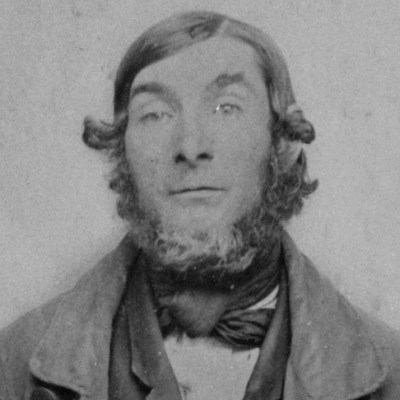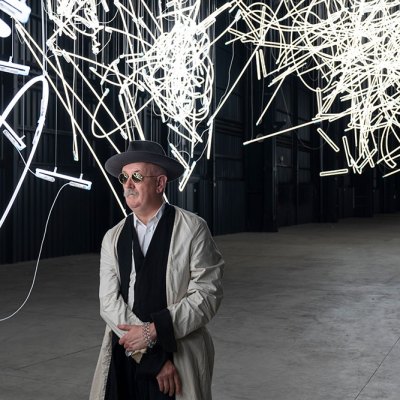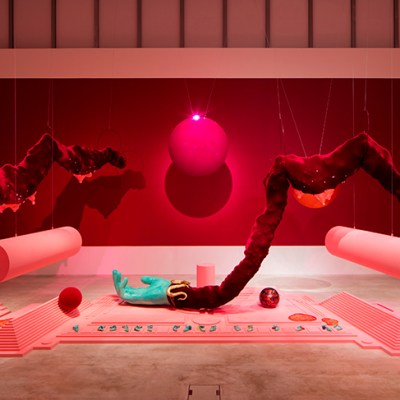Sheets of glass curve in flashy waves; a leather armchair in the shape of an open palm sits squat and comfy in front of a chunky television set; and a glass coffee table is propped up by a knock-off, chopped-up Corinthian column – upon which is placed a single tissue box, shaped like a tired, old sofa. There’s fake fur, velvet and animal hides. This eccentric, kitschy display is typical of Henrike Naumann’s work, in which the artist gathers together objects that come from and evoke a nostalgia for the ’90s – the ’90s in East Germany, in particular. Naumann was born in Zwickau in 1984, and this nostalgia is not only of a historical moment – a time when capitalist goods suddenly flooded the market – but of her own youth. ‘Das Reich’, her current exhibition at Belvedere 21 in Vienna, is comprised of a large room and courtyard loaded up with furniture, souvenirs and display cabinets of strange, slightly eerie bric-a-brac – including a rifle with a wooden stock tucked rather unabashedly into a glass cupboard.
The rifle is not the only evidence of a sinister undercurrent here. The show is a pointed critique – albeit one that is full of irony – of fascism and the far right. It is set in a fictional political moment: it is the year 1990 and the Reich Citizens’ Movement, which rejects the legitimacy of the Federal Republic of Germany, has assumed power after German reunification. Austria, too, joins this German Reich. The air is thick with radicalisation, and Naumann’s central characters are young, listless teenagers. We see them in the short films Terror (2012) and Amnesia (2012), placed at two ends of the space, and produced by Naumann on VHS video.
Installation view of ‘Henrike Naumann: Das Reich’ at Belvedere 21, Vienna, 2019. Photo: Johannes Stoll/© Belvedere; courtesy the artist and KOW, Berlin

In Terror, the protagonists Beate, Böhni and Uwe – named after the three friends and self-styled ‘National-Socialist Underground’ responsible for several terrorist attacks and murders between 1999–2011 – steal a VHS video camera and begin documenting their day-to-day life. Theirs is a typical teenaged existence with a neo-Nazi twist: bedrooms are plastered with swastika flags as they lounge around reading teen magazines. Uwe strikes a pose for the camera, shouting ‘Sieg Heil’ with a wink. Later they break into an abandoned school, wrestle (with a heavy erotic tension), and arrange four pistols into a swastika. The real National-Socialist Underground carried out three successful bombings (in Nuremberg in 1999, and Cologne in 2001 and 2004) and around 15 armed robberies (including a bank in Eisenach in 2011). They had met in the early ’90s club scene in Jena, a university town in East Germany, and attended radical right-wing youth meetings together. They carried out their crimes with the help of an extensive network.
Amnesia, set in 1992, takes us to Ibiza. Another group of teenagers – this time there are four – hang out in their hotel room in the Spanish seaside party town. They chain-smoke, drink and do line after line of cocaine. They dress up, and head to Amnesia, a hot new club. They are erratic and suddenly aggressive – one girl throws a vase into a glass pyramid in which just minutes before she had been admiring her own reflection. There’s a profound nihilistic boredom to their lives, something that is mirrored by the teenage trio in Terror, although, as Naumann puts it, these partygoers are not terrorists but ‘non-political hedonists’. Viewing the two works side by side, we are invited to consider how quickly the torpidity of youth can turn catastrophic and violent – and how easy it is to influence that shift. It is impossible not to think about the rise of neo-Nazi factions in both Germany and Austria.
Installation view of ‘Henrike Naumann: Das Reich’ at Belvedere 21, Viennia, 2019. Photo: Johannes Stoll/© Belvedere; courtesy the artist and KOW, Berlin

Ibiza also has a special significance to recent Austrian politics. In May 2019, the German newspapers Der Spiegel and Süddeutsche Zeitung published video of an hours-long conversation between two Austrian politicians from the far-right Freedom Party (FPÖ) – one of whom, Heinz-Christian Strache, was then acting vice-chancellor of Austria and leader of the party – and a woman posing as the niece of a Russian oligarch. They discuss the procurement of state building contracts by the Russian oligarchs in return for support through positive news coverage – facilitated by the takeover of a non-partisan Austrian media outlet. The group is in a hotel room in Ibiza, smoking and drinking, not unlike our young teenage protagonists in Amnesia. This leaked transcript (from a still unknown whistleblower) marked the beginning of a major political scandal – the ‘Ibiza affair’ – which brought down the entire Austrian government. As Naumann’s show opened, at the end of September 2019, national elections were about to be held.
‘Henrike Naumann: Das Reich’ is at Belvedere 21, Vienna, until 12 January 2020.



